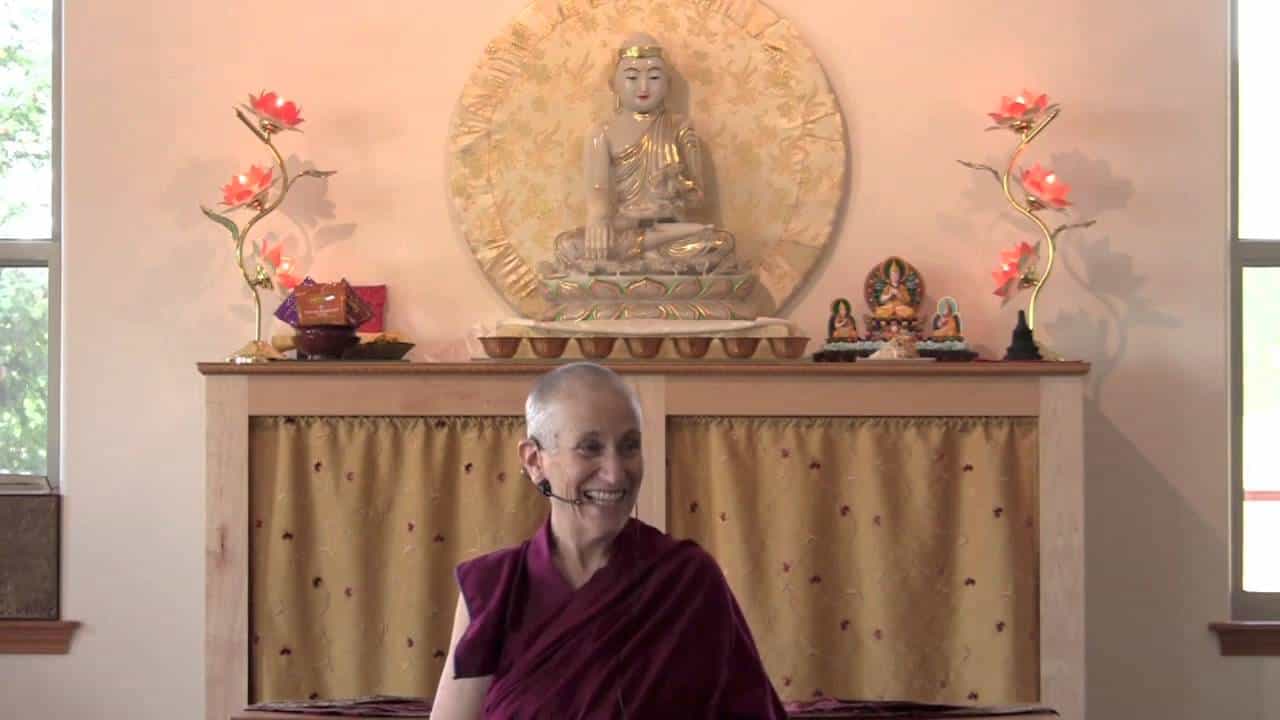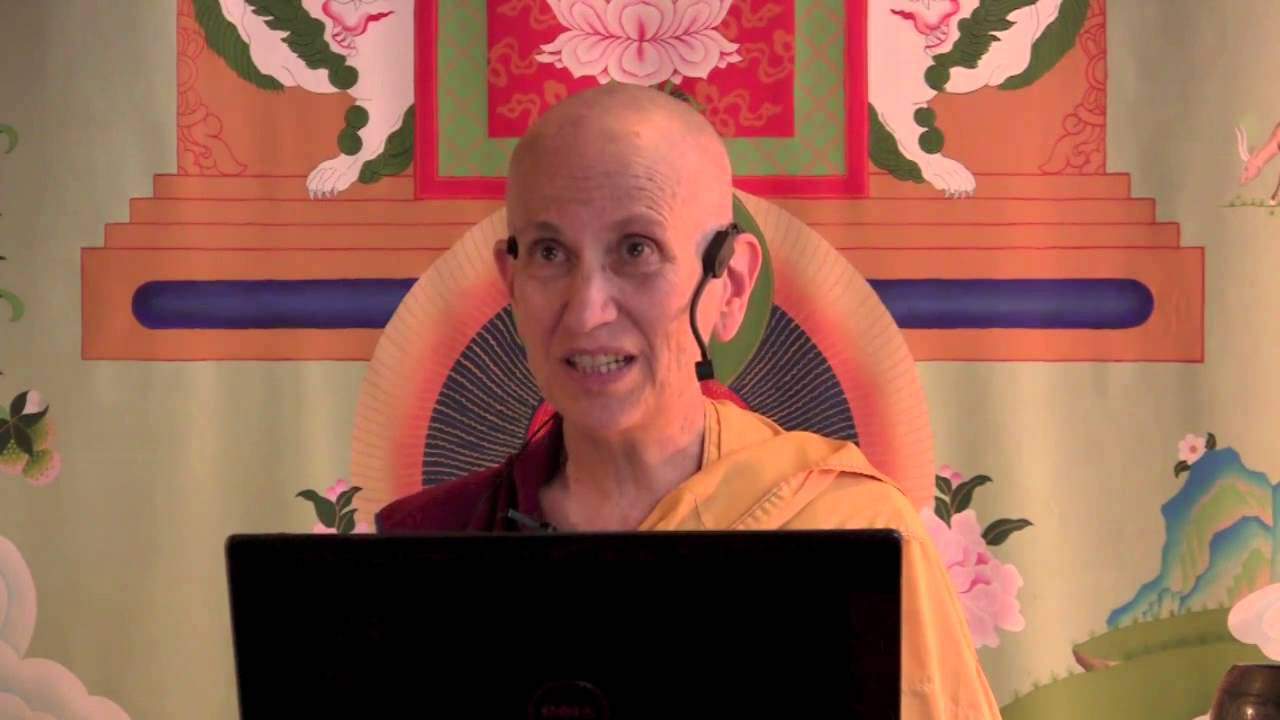The four fearlessnesses of the Buddha
Part of a series of teachings on the text The Essence of a Human Life: Words of Advice for Lay Practitioners by Je Rinpoche (Lama Tsongkhapa).
- Four qualities that give the Buddha great confidence
- Thinking about these qualities in terms of our own experience
- Having confidence that we can gain understanding and realizations
The Essence of a Human Life: The four fearlessnesses of the Buddha (download)
We started the other day to talk about refuge, so I wanted to continue about that today, talking specifically about some of the Buddha’s qualities.
There are many different lists of the Buddha’s qualities, which I won’t go into. We’ll cover more of them when we do the course Buddhism: One Teacher, Many Traditions, where we go into them more in depth. But one of them is the four fearlessnesses of the Buddha, and this is mentioned in the Pali scriptures as well. It’s four things that the Buddha is fearless in declaring that give him the great self-confidence to be able to teach whereby nobody else can criticize him for not knowing these four things, because he’s seen them through his own experience, his own meditative experience.
-
The first one is that no one can claim that he is not enlightened in regard to certain things. In other words, that he only has some kind of partial knowledge or enlightenment. So he’s confident in being able to say that he has overcome all the obscurations and is fully enlightened.
-
The second one is no one can criticize him saying that he hasn’t destroyed all the pollutants, all the defilements and afflictions. So again, he feels confident in being able to say that because that’s been his experience.
-
Third, no one can criticize him saying that you don’t know correctly what the obscurations are, what needs to be eliminated on the path. Again, because he’s eliminated those, he knows what they are, and he knows the result of having eliminated them, and he’s confident in that respect.
-
The last is that no one can criticize him saying that the Dharma that he teaches doesn’t lead to the destruction of dukkha, to the elimination of samsara. Again, because he’s accomplished that liberation and overcome samsara, he has the confidence to say that.
It sounds like a list, but when you think about it, think about it in terms of your own experience. What would it feel like for you to be able to say that you’re enlightened with respect to all things, that you’ve destroyed all the pollutants, that you know all the obscurations that need to be destroyed, and that you’ve destroyed them and eliminated all the dukkha of samsara? What would that be like for you, to have those qualities? How do you think you’d feel? How do you think you would relate to sentient beings then? You’d relate to them pretty differently, wouldn’t you? You wouldn’t kind of be goofing off all the time, because you saw they’re suffering, and the obscurations, you know how to eliminate them, you would be doing everything you can to be of benefit to sentient beings, and what you teach would be completely correct, so you wouldn’t have any, like, “Oh god, did I say that right?” kind of feeling at all, but be really confident in doing it.
These kinds of qualities—if you see them as just a list of qualities—sometimes you can’t relate to them. But then when you imagine what it would be like for you yourself to have them, then you get some feeling of what it must be like to be a fully awakened one, and you get some feeling of, perhaps, how the Buddha felt and what the Buddha’s mind was focused on, what he paid attention to, what he thought was important, what his priorities were in life.
If you had these four fearlessnesses, what would your priorities be in life? I don’t think it would be getting the best deal on the clothes that you want to buy or something like that. You would definitely be focused on something spiritual and on really benefiting others in the best way.
Thinking that way makes these kinds of lists of qualities come alive for you, and it gives you some feeling for them, and that in turn increases your faith and confidence and trust in the Buddha as a reliable guide because you can see, “Wow, if I had those qualities I would certainly be a reliable guide, this is what the Buddha has, so he’s a reliable guide. I can trust him, I can trust the teachings that he gives, I can trust the guidance of those who have realized the teachings.” In that way, knowing the qualities increases our faith and confidence and helps us then (because we have more faith and confidence) listen to the teachings with a more open mind, a more receptive mind, and to take the teachings really to heart. Whereas if we don’t really believe these qualities because we can’t imagine having them ourselves, and we say, “Oh, this is just some list somebody made up like they do over all the spiritual beings, glorifying them….” If we think like that, when we listen to the Buddha’s teachings we kind of think, “Well what does he know?” and we don’t listen with the same kind of ears.
Again, having confidence that it’s possible to gain this kind of understanding, and be fearless and totally self-confident in declaring it, depends on understanding that it’s possible to become fully awakened, and that depends on understanding that it’s possible to eliminate all the defilements. That depends on understanding that the root of the defilements is ignorance that grasps at inherent existence. And by understanding that, then we know that the wisdom that sees the lack of inherent existence, that realizes the emptiness of inherent existence, is capable of overcoming that ignorance so that all the obscurations can be removed, so that it’s possible to have a fully awakened mind.
You can see how many, many different things are connected and dependent on each other. The more we understand emptiness, the more we’re able to have confidence in the Buddha’s teachings, because that’s the root thing. The fact that things lack true existence is what enables us to know that the defilements that are the cause of cyclic existence can be stopped. The more we understand that, the more confident we are. Otherwise it’s just like, “Well, yeah, they say I can overcome my anger forever, but how in the world do you do that?” But when you see that anger depends on ignorance, and the ignorance can be overcome by the wisdom realizing emptiness, then you see, “Oh, yes, it’s possible to overcome my anger. And my jealousy. And my critical, judgmental mind. And my laziness. And all my excuse making. And all my self-hatred. Blah blah blah….” All the stuff we’re stuck in, we see that it’s possible to eliminate them, leaving the clear light nature of the mind.
Venerable Thubten Chodron
Venerable Chodron emphasizes the practical application of Buddha’s teachings in our daily lives and is especially skilled at explaining them in ways easily understood and practiced by Westerners. She is well known for her warm, humorous, and lucid teachings. She was ordained as a Buddhist nun in 1977 by Kyabje Ling Rinpoche in Dharamsala, India, and in 1986 she received bhikshuni (full) ordination in Taiwan. Read her full bio.


